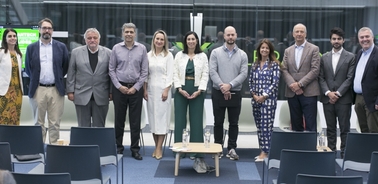IE’s Impact Xcelerator Holds CleanTech Innovation Collider

The event took place as part of the Cleantech Coalition meeting hosted by IE School of Science and Technology.
IE School of Science and Technology hosted the CleanTech Innovation Collider, with entrepreneurs, tech-industry leaders and top academics joining forces to tackle how the Iberian Peninsula can coordinate infrastructure, investments, regulation and breakthroughs to become one of the next European Hub of CleanTech.
With the title “Building Breakthroughs in CleanTech Innovation in Iberia for Join Vision in 2030” Ikhlaq Sidhu, Dean of IE School of Science and Technology, led the panel discussion to answer questions like which innovation will lead the market, what is the Iberian DNA in clean energy development, what are the main challenges to face for the development of new technologies?
The group of experts, which sought to advance research and innovation in Clean Technologies, included: Carlos Monreal, Founder and Chairman of Plastic Energy; Natalia Ruiz, managing Partner at Net Zero Ventures; Michael Geyer, Senior Technical Advisor at Malta Inc.; Bianca Dragomir, Director of Cleantech for Iberia; Alberto Toril, Europe Manager for Breakthrough Energy; David Gomez-Ullate Professor and Head of Faculty at IE School of Science and Technology.
For the panelists, the key challenges included: regulation, scalability, and business models.
“Everything related to CleanTech must be done at a global level in order to attract the necessary capital,” Monreal said.
But according to Geyer, in Europe, one of the main issues is securing a long-term financing commitment.
“The key is the transition from Power Point to power plant,” Geyer said. “But we need an upfront investment. When we go to banks, we show them long-term revenues, but we can’t predict the long-term cost of buying and or selling to create a plan for financing. Nobody will commit for 35 years because maybe it’ll get cheaper.”
Ruiz, however, said she did see cause for optimism.
“We have a funding problem. But, it’s the first time I’m seeing cross-sector companies working together because they share goals. For me that’s a good thing because they are joining forces to make it cost effective,” she said.
Monreal emphasized another challenge to address was European regulation.
“Europe is reducing its industry footprint. We’re becoming Disneyland for people to enjoy the beauty,” he said. “We are trying to regulate before becoming proved technologies. We cannot establish barriers to technologies. We can regulate growth and creativity.”
Students from the IE School of Science and Technology asked questions about future trends and entrepreneur opportunities, with panelists identifying organic chemistry, hydrogen and prediction models.
“Most of the cleantech energy comes from renewable sources. The more we can predict, plan and forecast, the better,” said Gomez-Ullate.
The event took place as part of the Cleantech Coalition meeting hosted by IE School of Science and Technology. IE School of Science and Technology. Cleantech for Iberia, a groundbreaking coalition aimed at propelling Iberian Clean Technologies to new heights, is comprised of 18 influential members, including key investors, innovative scaleup companies, and prominent universities across Spain and Portugal and boasts a collective fund size exceeding €1 billion. With a solid network, Cleantech for Iberia strategically brings together leaders in policy, investment, and innovation to catalyze a transformative impact on Iberia's cleantech economy.

